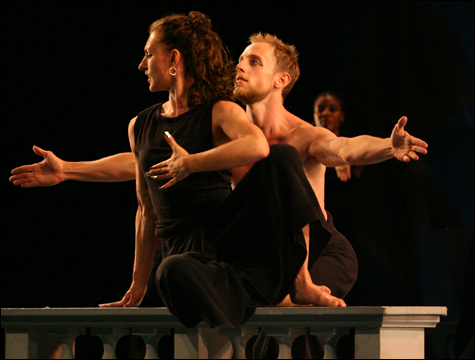Mark Morris revives Purcell’s Dido and Aeneas at Tanglewood; Cosí fan tutte on Beacon Hill

DIDO AND AENEAS: Amber Darragh and Craig Biesecker helped bring it back up to snuff.
|
In 1989, during his controversial residency in Brussels, Mark Morris created Dido and Aeneas, a dance setting of the hour-long operatic masterpiece that Henry Purcell had composed for performance by the students of Josias Priest’s School for Young Ladies 300 years earlier. It’s the greatest English opera before Handel, and — probably because of its modest requirements — more often revived than almost any other opera in English, though less often “revived” in the sense of being given new life.
For Morris, it became a gender-bending opportunity: he played both Dido, the Queen of Carthage who falls in love with the Trojan prince fleeing from the destruction of his homeland, and her nemesis, a Sorceress bent on Dido’s destruction. The two characters became alter egos, Janus faces: one longing for happiness, the other self-destructive, an embodiment of the impulse we have to undermine our own deepest desires. The Sorceress’s grotesque gestures mimic and mock Dido’s gestures of love and longing. (Dido’s passionate thrust of her hands downward from her chest toward her groin, for instance, gets inverted into a violent upward stomach-to-throat hara-kiri slash.) It was a tour-de-force for Morris the dancer; it was also a profound and moving contemporary interpretation.
The American premiere of Dido took place here in Boston, at the Majestic Theatre in June 1989. Craig Smith conducted the Emmanuel Orchestra, and the late Lorraine Hunt Lieberson sang a heart-rending Dido, with James Maddalena humanizing the cardboard Aeneas of Nahum Tate’s stilted but efficient libretto, tenor Frank Kelley as the voice of the malevolent Sorceress (more gender bending), and soprano Jayne West as Dido’s loving sister, Belinda. It became an instant cultural landmark; yet by 1998, Morris had decided to retire this staple of his repertoire. Was he getting tired of it? He said he was tired of having long hair. And perhaps he was no longer up to his own technical demands.
Then last year, as part of the Mark Morris Dance Group’s 25th-anniversary season at the Brooklyn Academy of Music, he resurrected Dido, with svelte and lithe Amber Darragh as Dido and rambunctious, exuberant Bradon McDonald as the Sorceress. It didn’t work. The insights one dancer in the two opposite roles had provided were lost, along with the concomitant technical excitement.
But Morris has again rethought Dido, and in two performances at Tanglewood’s Seiji Ozawa Hall last Thursday and Friday, Darragh played Dido and the Sorceress one night and McDonald both roles the following night. And though neither dancer has quite the uninhibited wildness and pinpoint control that Morris possessed in his best years as a dancer, or the dominating largeness — and largesse — of his gestures, the real Dido and Aeneas is now back. These were both satisfying performances, and Bostonians will have a chance to see them next May, back at the Majestic, as part of the Celebrity Series of Boston, with Morris conducting.
I’m reluctant to make invidious comparisons. Long-limbed and elegant, Darragh is one of Morris’s most ravishing dancers. No movement of hers isn’t beautiful, even when, as the Sorceress, she’s parodic. As a woman playing two women, she can’t convey the sexual tension inherent in the original cross-dressing. As a queen, she’s naturally regal and feminine. McDonald, as a man, has to feminize his regality; he’s less female but more feminine than Darragh. When she’s the Sorceress, Darragh’s coarseness is a theatrical jolt, because it’s such a contrast to her refinement as Dido. McDonald is a broader witch, almost slapstick — more like Morris. Both dancers make poignant Didos; both are funny and sinister as her evil twin. For both Darragh and McDonald, playing both roles sharpened their performances of the one they’d played before.
The 10 dancers wearing ambisexual black sarongs were characterful and precise as “Courtiers, Witches, Spirits, Sailors, and Conscience.” Standouts included hunky, bare-chested Craig Biesecker as the tormented Aeneas, touching Maile Okamura as Belinda, and tiny Lauren Grant as a “boozy” hornpiping sailor.
The orchestra and the singers were perched up in the balcony behind the Ozawa Hall stage. The superb British contemporary-music specialist and Tanglewood familiar Stefan Asbury was scheduled to conduct, but visa problems, I gather, prevented his timely arrival, so Tanglewood Music Center conducting fellow Kazem Abdullah, who’d prepared all the rehearsals, substituted. He maintained a crisp, lively pace that also allowed him to be expansive and elegiac in the final tragic moments. The playing was tight and charming. Craig Smith’s conducting was broader, larger-scaled, reflecting Morris’s own grandeur. But I suspect Abdullah was giving Morris exactly the new buoyancy he wanted.
The singers, also TMC fellows, had good and sometimes beautiful voices. Soprano Eve-Lyn de la Haye and alto Rebecca Jo Loeb, in small roles, and bass Mischa Bouvier in the chorus had already impressed me playing leading roles in the Pops Carousel last month. (They’ll be back for the Tanglewood performance this Tuesday, June 10.) Alto Christin-Marie Hill, who last summer appeared in the American premiere of Elliott Carter’s opera What Next?, sang an imposing, biting Sorceress. She was one of the few singers — baritone Christopher Johnstone as Aeneas was another — whose words I could make out.